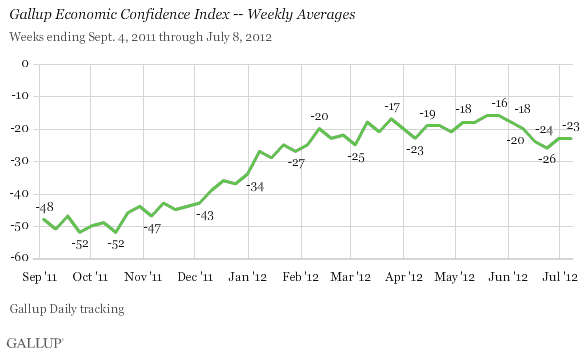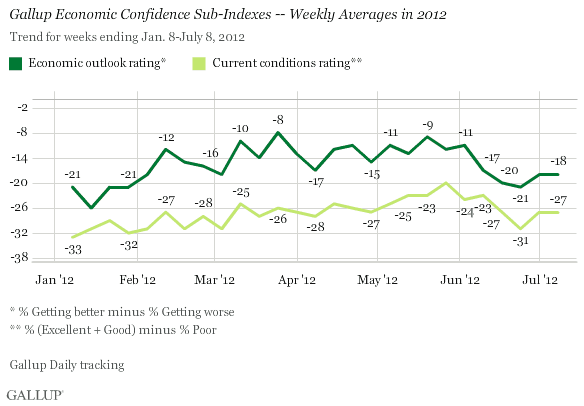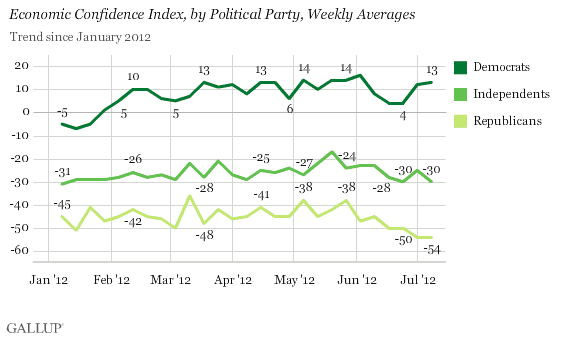WASHINGTON, D.C. -- The Gallup Economic Confidence Index was -23 for the week ending July 8, unchanged from the week before but improved slightly from the dip to -26 in mid-June. Confidence deteriorated toward the end of the week, slipping from -19 in Gallup's continuous three-day rolling averages, after the Bureau of Labor Statistics released its June jobs report that showed little jobs growth and a flat unemployment rate.

Gallup's Economic Confidence Index consists of two measures -- one assessing current economic conditions and the other assessing the nation's economic outlook. Americans' attitudes about both were unchanged last week. The -18 economic outlook rating reflects 38% of Americans saying the economy is getting better and 56% saying it is getting worse. Fourteen percent of Americans say the economy is excellent or good, while 41% say it is poor, resulting in a -27 rating of current economic conditions.

Gap Between Democrats' and Republicans' Views Grows to Largest Yet
The gap between Democrats' and Republicans' views on the economy has widened considerably since the beginning of the year, most likely reflecting the intensifying presidential campaign. Democrats' Economic Confidence Index score of +13 last week compares with a score of -54 among Republicans -- reflecting the largest gap since Gallup began collecting economic confidence data in 2008. The current 67-percentage-point difference compares with a gap of 43 points for all of January. Independents' views remain negative at -30.

Implications
While economic confidence remained flat last week, the late-week dip on the heels of the June jobs report may signal future pessimism that could carry well into the month of July, much as it did in June after the sour May jobs report. On the other hand, President Obama asked Congress on Monday to extend the Bush-era tax cuts for families making less than $250,000 a year. This may come as welcome news for the majority of American households and could brighten public perceptions of the economy, or of Obama's willingness to spur its growth. It will be interesting to monitor the trends, both for Americans as a whole and within political parties, as voters continue to assess Obama's performance and the economy as the top factors affecting their presidential election preferences.
Gallup.com reports results from these indexes in daily, weekly, and monthly averages and in Gallup.com stories. Complete trend data are always available to view and export in the following charts:
Daily: Employment, Economic Confidence, Job Creation, Consumer Spending
Weekly: Employment, Economic Confidence, Job Creation, Consumer Spending
Read more about Gallup's economic measures.
View our economic release schedule.
Survey Methods
Results are based on telephone interviews conducted as part of Gallup Daily tracking from July 2-8, 2012, with a random sample of 2,871 adults, aged 18 and older, living in all 50 U.S. states and the District of Columbia, selected using random-digit-dial sampling.
For results based on the total sample of national adults, one can say with 95% confidence that the maximum margin of sampling error is ±2 percentage points.
Interviews are conducted with respondents on landline telephones and cellular phones, with interviews conducted in Spanish for respondents who are primarily Spanish-speaking. Each sample includes a minimum quota of 400 cell phone respondents and 600 landline respondents per 1,000 national adults, with additional minimum quotas among landline respondents by region. Landline telephone numbers are chosen at random among listed telephone numbers. Cell phone numbers are selected using random-digit-dial methods. Landline respondents are chosen at random within each household on the basis of which member had the most recent birthday.
Samples are weighted by gender, age, race, Hispanic ethnicity, education, region, adults in the household, and phone status (cell phone only/landline only/both, cell phone mostly, and having an unlisted landline number). Demographic weighting targets are based on the March 2011 Current Population Survey figures for the aged 18 and older non-institutionalized population living in U.S. telephone households. All reported margins of sampling error include the computed design effects for weighting and sample design.
In addition to sampling error, question wording and practical difficulties in conducting surveys can introduce error or bias into the findings of public opinion polls.
For more details on Gallup's polling methodology, visit www.gallup.com.
